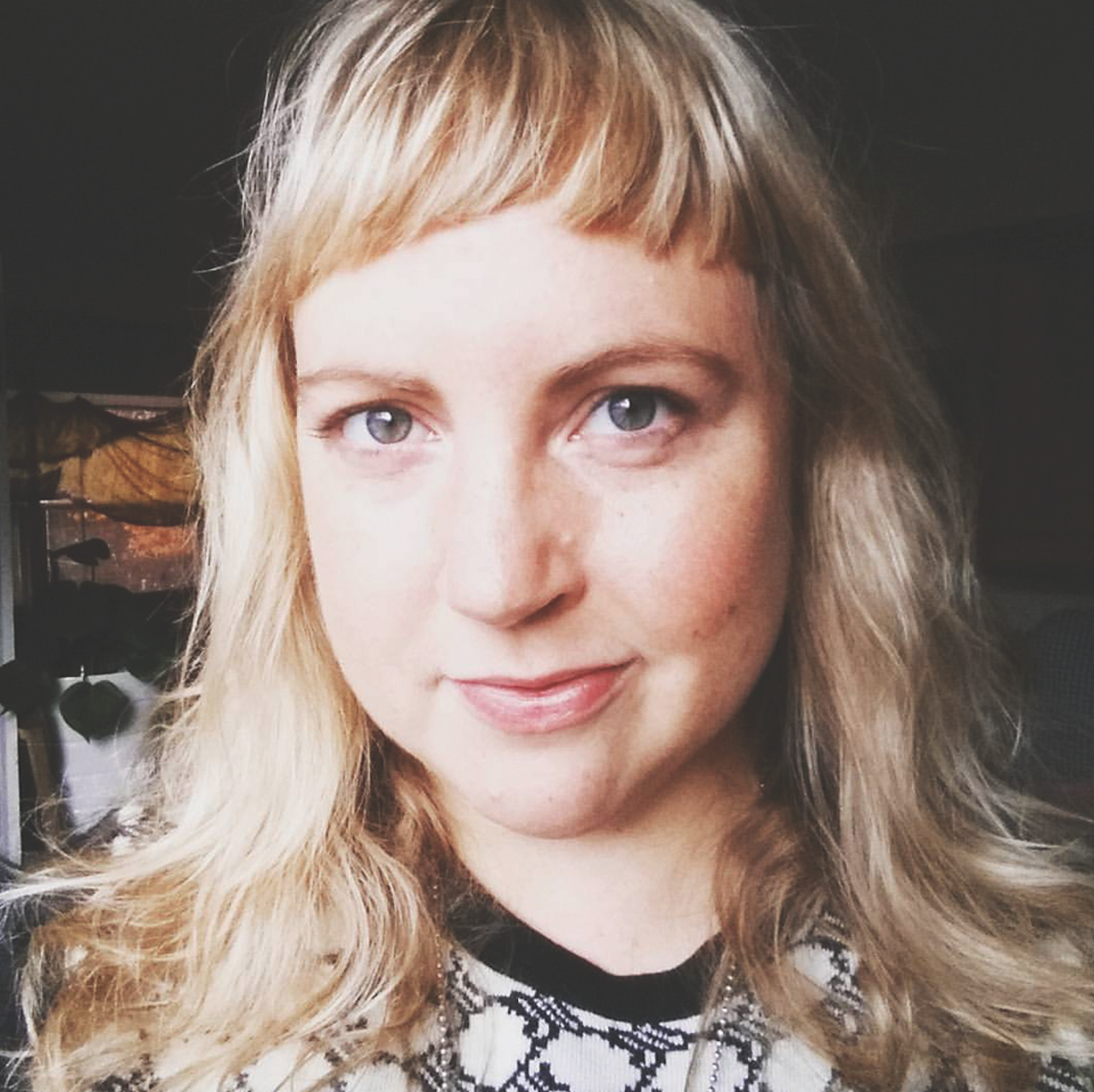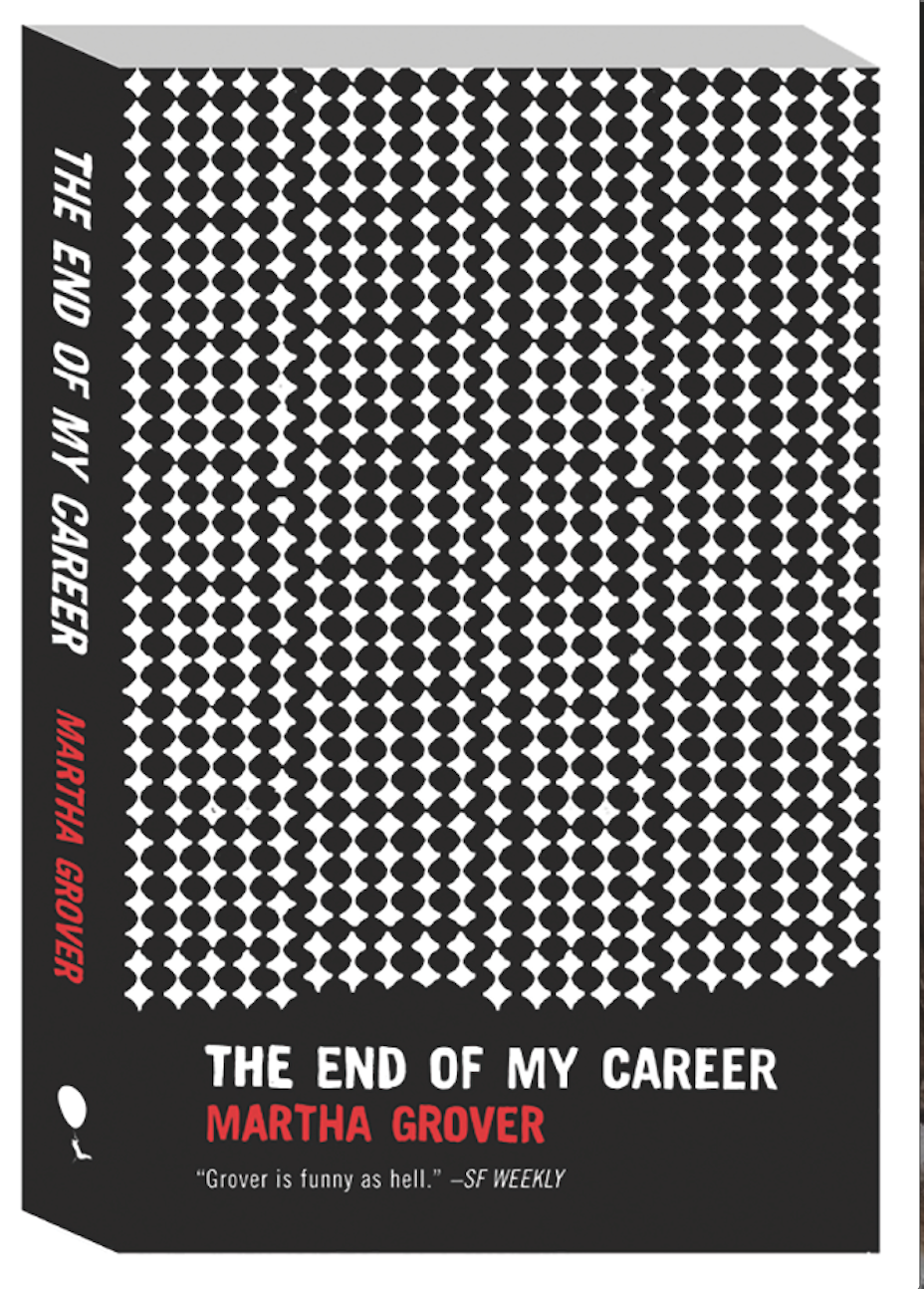Portland writer Martha Grover


With a sharp wit and keen sense of local history, Martha Grover’s writing has scope and clarity that seem to have gone missing in the last few years. The stories that make up her newly released memoir, The End of My Career, have an honest and relatable tone to them that makes you feel like you’re talking to an old friend on the phone (if anyone still does that).
The memoir is Grover’s second title out on Perfect Day Publishing. While One For the People was based mainly on her family, The End of My Career is her highly personal account of seeking love through OkCupid and and taking on menial labor jobs, all while while coping with chronic Cushing’s disease. In “Cleaning Jack’s House” she reveals the realities of house cleaning detailed with Palahniuk-like precision. Her honest accounts of her string of relationships from online dating sites are scattered throughout the book, hilarious and sometimes terrifying.
Grover has been publishing her zine Somnamulist since 2003 and has been working at her new career in real estate in the midst of one of the biggest housing booms the Portland area has ever seen. She remains true to herself and adamant about keeping alive the spirit of the Sandy River.
ELEVEN: How long have you been documenting the ever-changing population of Portland?
Martha Grover: So just as an Oregonian, I’ve been documenting it in my mind, but as you can see in the book it really didn’t hit me for a long time. In the book I talk about moving up to Portland with all these people I went to the U of O with. Eighty percent of whom were not from here, and I didn’t have any angst or animosity towards them.
ELEVEN: In one chapter you mention that when you went out to Gresham you would hear a lot of complaints about “Portland people.”
MG: Yes that comes later. The realization that the city was fundamentally changing didn’t hit me until around 2005-06, that was bubbling up. But you know I was 23 when I started my zine. So how much awareness do you have of anything at that point? When the zine started out it was mostly personal stuff. A lot of stuff about my family and my childhood, and getting sick and it wasn’t really about Portland, per se. When I moved to San Francisco to get my grad degree, and then came back, it was like whoa! It was full-on. That was in 2011. So being away for two years … it’s like putting a frog in water … but if you leave and jump right back in you’re like, “Whoa, what’s going on here?”
ELEVEN: Can you tell me about these letters from your friend in China in one of the later chapters? I could definitely see some parallels to what’s going on in Portland.
MG: For the last three years I’ve been doing this project that’s really cool. Every year I set up some kind of correspondence with someone that lives in a different country. And TJ was an old student of mine; I was kind of his mentor and helped him out with his writing. He decided to go teach English in China. So I said, “I’ve been thinking about this for a while: Why don’t we do this project where we write each other letters?” He was in this place called Xi’an China, which is where the Terra Cotta Warriors are. It’s a historical, old place.
So what he talks about is how they’re destroying all of these old buildings that you would think of as “China” visually. Knocking down the classic pagodas and putting up these high rises. So in that letter in the book he writes, “In the year I’ve been here, these are all the things that have changed.” So I think that it’s this weird balance where, and this can go for any social issue where people think that they have it so much worse, or “Why are you complaining about this? Look at what happened in North Portland. You’re not an African American whose community was completely obliterated, so suck it up.” But especially if you’re from here and have been here for any legitimate amount of time, I think it’s a legitimate grief. Change is hard, and it really bothers me when people say “change is change.” That is not an easy thing, and I don’t think it’s helpful to downplay the legitimate grief that people feel.
ELEVEN: How did your stint as a house cleaner influence your writing?
MG: When I got really sick, that was an opportunity that was open for me. The only barrier to me doing that as a job is that I could only work four hours a day because I was chronically ill. I always tell people that if I could be doing it now, I would still be doing it. It’s the best job I ever had. And it’s very good for writing. Because if you are thinking all day, and you’re not having to interface with someone, it’s a really good way to go through your process. My writing process is thinking an idea through many, many times before I even sit down to write about it. So by the time I sit down to write about it, I pretty much know what I’m going to write and I can finish it. I’m not someone who writes every day, but I am someone who thinks through what I’m going to write about every day.
ELEVEN: You write a lot about your experiences dating on OkCupid. I think a lot of the humor lies in those stories, like when you write “I cannot sleep with someone who dresses like a pirate.” But you’ve met people there and had long-term relationships?
MG: I’ve had actual relationships from people I’ve met on OkCupid. And then this funny thing happened after my last relationship ended where I decided I’m going to get back online, but take it really slow and see how things progress. I’ve had the worst dating year of my life from that. [Laughs.] Before my book came out, I deactivated my Tinder and my OkCupid because I’ve had one bad experience after another. Because I have had a lot of bad, and scary experiences.
ELEVEN: Like the women’s studies major who was hiding his violent past? How do you gain a level of trust from someone that you just met online? I feel like a lot of people put on a facade.
MG: Yes. I think as a woman you have to be very careful, because predators will go to these sites. It’s like that Louis CK skit where he says that any woman who dates is risking her life, and it’s true.

ELEVEN: You’ve recently been called the voice of Portland [in Portland Mercury], but live in Gresham. How do you speak for Portland as a part of it and removed from it at the same time?
MG: I don’t necessarily think I speak for Portland, but I do think I have a unique perspective on the state and the area because I’ve lived here my whole life. I know a lot of the hidden history of Portland and the racist history of Oregon. Growing up in the Gorge, and what happened with Celilo Falls. My grandma went and bought salmon from Native Americans before they dammed Celilo. It was the longest inhabited site in all of North and South America by humans and they completely obliterated it.
ELEVEN: The title The End of my Career is about your work as a PI. What made you decide to use that story for the title?
MG: I had been working on a book in a nebulous way before Michael [Heald] even asked me to write this one. The title of that essay was actually first “The PI Story” and he thought it was kind of a lame title. But I had already thought the book was going to be called The End of my Career because the funny thing is that for the first time in my life have a career, as a real estate agent. I never had a job that was a career before that. So I see all of that freelancing I did, in the weird way I was doing it, was a career.
ELEVEN: So why is the Sandy River so important to you?
MG: Well, natural areas in general are important to me. There was a picture that someone posted on Facebook of Oneonta Gorge ten years ago, and then last summer. There were people crawling all over it. It made my skin crawl, as if I were the Gorge. There’s protected areas, there’s state parks, and there are wilderness areas and they are all very fragile. At the same time it feels like they are the last safe places to be attached to, in this kind of sad way. Where it’s like, I can’t get attached to this coffee shop because it may go out of business, or this cool old house is gonna get knocked down and this condo is going up. I’m really just hurting myself if I get too attached to places in the city. But I can get attached to the Sandy by getting really fierce and feeling protective.
ELEVEN: They’re not gonna build condos on the Sandy River?
MG: They’re not going to. People might go there to burn tires and leave their beer bottles, but it will always be there, hopefully. The Sandy River I grew up on is a beautiful river. There are still places you can go to that are completely free of people, at least during the week.»
– Scott McHale



